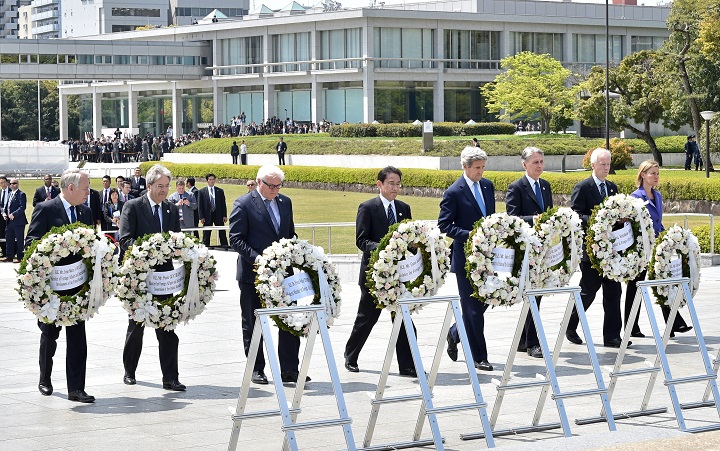OTTAWA – Foreign Affairs Minister Stephane Dion says Canada can help kickstart the world’s stalled nuclear disarmament efforts by pushing for tougher controls to prevent terrorists from building a nuclear weapon.

Dion joined his G7 counterparts on Monday in calling for a renewed effort towards nuclear disarmament after visiting the atomic-bombed Japanese city of Hiroshima.
But the minister also appeared to express frustration at what many see as the glacial pace of nuclear disarmament efforts.
READ MORE: Foreign ministers push nuclear disarmament at G7 meeting in Hiroshima
“It’s a challenge because over the last 20 years, it’s stalled,” Dion said in an interview from Tokyo, adding that there’s been “no major progress” on ridding the world of nuclear weapons in that time.
Dion said Canada will focus on the growing international effort to revive the Fissile Material Cut-off Treaty, or FMCT. It has been more than half a century since the United Nations embarked on creating the treaty, which would control the spread of nuclear materials.
“What I think we should do, very strongly, is focus on the Fissile Material Cut-off Treaty,” he said. “It’s the one that is the least difficult to reach.
“I’m not saying it’s easy.”
Canada picked up the ball on the treaty in 2012, sponsoring a resolution at the UN General Assembly establishing a commission of experts to push for its creation.
The proposed treaty would outlaw the production of the highly-enriched uranium and plutonium, the key ingredients for building a bomb. Earlier this month, Canada pledged $42 million towards the global effort to protect fissile materials at the Washington summit hosted by President Barack Obama, where the need to prevent terrorist groups from acquiring bomb making materials was a hot topic.
READ MORE: US to not offer Japan an apology for Hiroshima during visit
Paul Meyer, a retired diplomat and former Canadian disarmament ambassador, said Canada’s past actions supporting FMCT efforts leave it “uniquely positioned to be the champion among like-minded states” to make sorely needed progress.
“There is a real need to move from talking points to negotiating points on the FMCT if the global non-proliferation and disarmament regime is to retain credibility.”
Otherwise, Monday’s G7 declaration was filled with “stale slogans” and lacked any concrete plan of action, said Meyer.
WATCH: Stéphane Dion sells new approach on Iran sanctions

The International Campaign to Abolish Nuclear Weapons, a global umbrella group for hundreds of organizations, said it is not helpful that the G7’s nuclear powers – the United States, Britain and France – are not taking part in a United Nations conference to be held next month in Geneva that will look at creating new laws around nuclear weapons.
“The G7 countries should join the majority of governments that recognize this and participate in the process to prohibit nuclear weapons,” the group’s executive director Beatrice Fihn, said in a statement.
Dion and his fellow ministers joined U.S. Secretary of State John Kerry, who is the highest-ranking U.S. official to visit Hiroshima since the Second World War, when the U.S. dropped the first atomic bomb there, eventually killing 140,000 people.
“Mr. Kerry showed a lot of dignity, a lot of respect, for the consequences, for the victims,” said Dion.
“Of course I thought about the victims. But my colleague the minister of foreign affairs of Japan said at the outset, this visit is not about the past, it’s about the future.”
Japanese Foreign Minister Fumio Kishida said the G7 declaration would reinvigorate nuclear non-proliferation efforts, which have waned.
Kishida said “it was significant that the G7 ministers saw the reality of the atomic bombing,” at the Hiroshima memorial.
The museum the G7 ministers visited graphically displays the effects of the American blasts on Hiroshima and Nagasaki in August 1945, including torn children’s clothing and the deformities caused by radiation. Kerry called it “gut wrenching.”
The G7 communique condemned North Korea’s recent nuclear tests and missile launches.
Dion said it was a positive step to see China support new sanctions against North Korea, but said the country needs to exert more of its influence “to convince the North Korean regime and their leader to stop threatening the world.”
The G7 ministers also condemned the recent terror attacks in Belgium, Turkey, Nigeria, Pakistan and Ivory Coast.
- Some 2019 candidates ‘appeared willing’ to engage with foreign interference: Hogue inquiry
- Princess Anne to help commission new navy vessel in B.C. ceremony
- Foreign interference ‘undermined’ public confidence in elections: inquiry
- Canada, Manitoba to develop Red Dress Alert for missing Indigenous women and girls



Comments